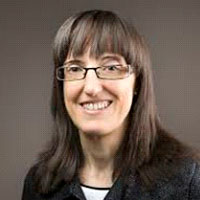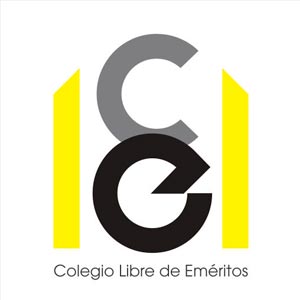Master´s Degree in Bilingual Education

We train teaching professionals
This program responds to the need to train qualified professionals in compulsory non-university education, who need to strengthen their language competence and adapt to new social needs and the demands of both public and private bilingual education centers.
This master's degree provides students with an updated training in bilingual education that also allows them to obtain the linguistic qualification required in some autonomous communities. The lessons are taught exclusively in English.
The study plan has been developed in response to the needs of teachers teaching through the medium of a foreign language. It examines how to improve their professional performance in bilingual and multi-lingual contexts and looks at how new technologies can applied to teaching via a foreign language. It also looks at current methodological trends for the teaching of multiple sub-linguistic competencies.
Official Degree:Master´s Degree in Bilingual Education
Center responsible:School of Language and Education
Branch of knowledge: Arts and Humanities
Openings available: - Online: 100
Total Credits:60 credits.
. Minimum of 12 ECTS credits and maximum of 60 ECTS credits per enrollment and academic period.
Academic year in which it was implemented: 2011-2012
Duration: 1 year
Type of Education: Online
Academic Regulations: General student’s regulations. Credit transfer and recognition. Regulation of student participation. Common procedures for carrying out the Final Research Project
University Services: [+info]
Why study the Master's Degree in Bilingual Education
Curriculum
It is an official Postgraduate program, R.D. 1393/2007 of October 29 (B.O.C.M. of October 30, 2007), recognized in the European Higher Education Area (Bologna Agreements), valid throughout the European Union.
The Master's Degree in Bilingual Education is an official postgraduate degree, recognized by ANECA through a favorable report on 07/29/2011.
The student must take 60 credits
First Semester 24 ECTS
- 4 ECTS | Psycholinguistics and Interlanguage
- 44 ECTS | Sociolinguistics and Pragmatics
- 44 ECTS | Communicative Approach and Task-Based Learning
- 44 ECTS | Communication Skills
- 44 ECTS | Research Methodologies
- 44 ECTS | Design and Programming of CLIL Courses
- 44 ECTS | Technology Applied to the Teaching of L2
Second Semester 36 ECTS
- 4 ECTS | Developing CLIL Materials
- 4 ECTS | Management of Bilingual Centers
- 6 ECTS | Elective 1
- 6 ECTS | Elective 2
- 6 ECTS | Internship
- 6 ECTS | Master's Final Research Project
Information on the types of Subjects
The student will choose two of the following electives:- 6 ECTS | Didactics of Social Sciences, History and Geography
- 6 ECTS | Didactics of Artistic Expression
- 6 ECTS | Didactics of Natural Sciences, Biology, Physics, Chemistry and Geology
- 6 ECTS | Stay Abroad (a 2 week stay at a partner school in the UK)
- 6 ECTS | Didactics of Technology
- 6 ECTS | Didactics of Social and Natural Sciences (aimed at Primary)
- 6 ECTS | Literature and Culture of English-Speaking Countries
The students' professional and research experience can be validated through a positive assessment of the Admissions Commission of the Master's degree program.
For the purposes foreseen in the current and applicable legislation, with the objective of making the mobility of students effective, it is understood that recognition is the acceptance by the Antonio de Nebrija University of the credits that, having been obtained in some official studies, in this or another University, are computed into different studies for the purpose of obtaining an official degree.
The following credits obtained by the student will be recognized in the new studies:
- a) Those corresponding to basic training subjects between degrees belonging to the same branch of knowledge.
- b) Those that are of basic training in the degree that is accessed and come from degrees of other branches of knowledge.
- c) The credits taken in university education leading to the obtaining of other degrees, referred to in article 34.1 of Organic Law 6/2001, of December 21, on Universities.
- d) Accredited work and professional experience, provided that this experience is related to the competences inherent to the degree.
- e) The remaining credits may be recognized by the University taking into account the Competences and knowledge associated with the subjects taken by the student and those provided for in the curriculum or that are transversal.
The maximum number of credits of cases c) and d) may not exceed, as a whole, 15% of the total credits that constitute the Curriculum.
Likewise, the transfer of credits implies the inclusion in the official accrediting academic documents the studies taken by each student, of the credits obtained in official courses previously taken, in this or another University, which have not led to the obtaining of an official degree.
Credit recognition must be requested by the student at the time of formalizing their enrollment. Exceptionally and with explicit authorization, a different time period may be established. The student must also pay the fees established for this purpose.
Criteria for the recognition of credits and their justification in cases c) and d)
- 1.- Regarding credits taken in university education conducive to obtaining other degrees, referred to in article 34.1 of the Organic Law 6/201 of December 21, on Universities, the following criteria will apply:
- 1.1.- CRITERION No. 1.- The usual criterion of credit recognition will be applied, that is, recognition will be carried out when there is a substantial identity between the competences of the subject studied in the degree of origin and the competences of the subject that is recognized. This criterion is justified by the usual practice in the recognition of university credits.
- 2.- In the case of recognition by accredited work and professional experience, the following criteria will apply:
- 2.1.- CRITERION No. 2.- The recognition of credits for accredited work and professional experience will be carried out if said experience is related to the competences inherent to the degree in the subject to be recognized. The accreditation may be based on reports and/or certificates issued by the companies or entities in which the activity was carried out, professional associations, etc. This is justified in the wording of RD 861/2010, which requires the accreditation of that experience, and it seems logical that such accreditation is carried out by third parties.
The submission of this type of reports and/or certificates that accredit the work and professional experience will be a necessary, but not sufficient, condition for the recognition of these credits, since it will ultimately be the Antonio de Nebrija University that decides whether or not to proceed with the recognition of credits in view of the accreditation presented, in application of current legislation, in the exercise of its university autonomy and in accordance with its internal credit recognition procedure. - 2.2.- CRITERION No. 3.- The recognition of credits for accredited work and professional experience, together with those taken in other higher education, will have a maximum limit of 15% of the total credits that constitute this curriculum. This is justified because this is stated in the aforementioned RD 861/2010.
- 2.3.- CRITERION No. 4.- The credits for professional experience may be recognized taking into account the adaptation of the competences and knowledge acquired, associated with that previous professional experience and those corresponding to the subject to be recognized. In no case will a general recognition of credits be made based on years of experience or any other similar general criteria.
- 2.4.- CRITERION No. 5.- In the recognition of professional experience, any type of professional experience, distantly related to the competences of the subject whose recognition is requested, will not be admitted, but rather will be recognized only in the case of a good adaptation between those competences and professional practice. Recognition will also be denied if the student’s experience was brief. Therefore, the credit recognition commission will assess at the time of recognition a balance between the characteristics of that experience, where it has been carried out and its duration.
- 2.1.- CRITERION No. 2.- The recognition of credits for accredited work and professional experience will be carried out if said experience is related to the competences inherent to the degree in the subject to be recognized. The accreditation may be based on reports and/or certificates issued by the companies or entities in which the activity was carried out, professional associations, etc. This is justified in the wording of RD 861/2010, which requires the accreditation of that experience, and it seems logical that such accreditation is carried out by third parties.
Nebrija University will take special care in the process of credit recognition for professional experience, which will be applied with a restrictive criterion and a clear correlation between experience and recognized competences, for a correct and orderly development of the new legal scenario, and within the framework of the instructions issued by ANECA, both in the verification processes and in view of the accreditation processes of the degrees.
Documentation
Students must present the following documentation to the Courses Secretary:
- Academic Record (original or certified photocopy) stating the name of the subjects, their type, the number of ECTS credits and the qualification obtained by the student.
- In the case of the credits mentioned in sections b), c) and e) they must submit the detailed program of the subjects (sealed original or certified photocopy).
- In the case of the credits mentioned in section d), they must submit the documentation proving professional and work experience.
The University may also request as much additional documentation as it deems appropriate.
The Courses Secretary will send the submitted documentation to the Academic Committee of each department, which will issue the appropriate resolution accepting or denying recognition and/or transfer.
All the credits obtained by the student in official studies taken at any University, the transferred ones, the recognized ones and the ones passed for the obtaining of the corresponding degree, will be included in his/her Academic Record, and reflected in the European Supplement to the Degree, if it is requested. The recognition of the credits in cases c) and d) will not include their grade, so they will not be computed for the purpose of scaling the record.
Documentation and information for the recognition process and sending of an indicative estimate.
Credit recognition is possible through the academic record and professional experience in the case of the Practicum.
Nebrija University will carry out, upon request of the applicant, a previous study of credit recognition without any commitment or cost. For this, it will be necessary for the candidate to submit his/her academic record, together with the curricula of the subjects and their updated curriculum vitae.
Professors
| Profesores Professors | Porcentaje de Doctores Percentage of PhD holders |
| 18 | 88,9% |
Profesores
Professors
Metodología docente eminentemente práctica. Todos los profesores tienen experiencia profesional acreditada en su área de docencia.
Eminently practical teaching methodology. All professors have proven professional experience in their teaching area.
 Stephen Jenkins
Director del Máster en Enseñanza Bilingüe
Director of Master's Degree in Bilingual Education
Doctor en Historia contemporánea española por la Universidad de
Lancaster, Reino Unido. Posee un Máster en Historia Moderna Social.
Ha trabajado durante 25 años en la formación lingüística en empresas,
sobre todo en seminarios de destrezas para los negocios y temas de
interculturalidad. También ha trabajado en la gestión de varias escuelas
de español como lengua extranjera en Madrid y Barcelona.
Stephen Jenkins
Director del Máster en Enseñanza Bilingüe
Director of Master's Degree in Bilingual Education
Doctor en Historia contemporánea española por la Universidad de
Lancaster, Reino Unido. Posee un Máster en Historia Moderna Social.
Ha trabajado durante 25 años en la formación lingüística en empresas,
sobre todo en seminarios de destrezas para los negocios y temas de
interculturalidad. También ha trabajado en la gestión de varias escuelas
de español como lengua extranjera en Madrid y Barcelona.
 María Eugenia Álava
Profesora
Professor
Estudia en la Universidad de Deusto, en Bilbao, el grado de Lenguas Modernas, que termina de cursar en 2016. Después realizó el Máster del Profesorado de Secundaria en la misma universidad. Estudian un programa máster de Literatura Comparada y Estudios literarios, en la Universidad del País Vasco, y un posterior doctorado en Literatura comparada que finaliza con mención Cum Laude en noviembre de 2020 con la lectura de la tesis titulada: Una poeta comprometida del medio siglo: Angelina Gatell.
Junto con ello ha trabajado como educadora en diversos programas, tanto en inglés como en castellano, en ciclos de secundaria así como en grados y másteres universitarios.
María Eugenia Álava
Profesora
Professor
Estudia en la Universidad de Deusto, en Bilbao, el grado de Lenguas Modernas, que termina de cursar en 2016. Después realizó el Máster del Profesorado de Secundaria en la misma universidad. Estudian un programa máster de Literatura Comparada y Estudios literarios, en la Universidad del País Vasco, y un posterior doctorado en Literatura comparada que finaliza con mención Cum Laude en noviembre de 2020 con la lectura de la tesis titulada: Una poeta comprometida del medio siglo: Angelina Gatell.
Junto con ello ha trabajado como educadora en diversos programas, tanto en inglés como en castellano, en ciclos de secundaria así como en grados y másteres universitarios.
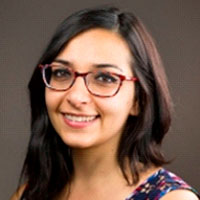 Zeina Alhmoud
Profesora
Professor
Doctora en Lingüística Aplicada a la enseñanza de lenguas por la Universidad de Granada (2016). Licenciada en Lenguas Modernas (español e inglés) por la Universidad de Jordania (2006). Tiene más de cuatro años de experiencia como profesora de inglés como lengua extranjera. Ha hecho varios trabajos de ilustración y elaboración de presentaciones didácticas, entre ellos el proyecto de investigación, financiado por el Ministerio de Educación y Ciencia de España, “Gramática avanzada de español lengua” extranjera (FFI2009-13107). Universidad de Granada (Investigador Principal Alejandro Castañeda Castro). Actualmente es profesora del Departamento de Lenguas aplicadas de la Universidad Nebrija. Imparte clases en el Grado de Lenguas Modernas, el Máster en Didáctica de ELE y el Máster en Lingüística Aplicada. Es miembro del grupo de investigación LAELE de la Universidad Nebrija y participa en el proyecto de investigación del Plan Regional (IN.MIGRA2-CM). Su área de investigación se centra en la lingüística cognitiva y su aplicación a la enseñanza de segundas lenguas, y el uso de las imágenes y animaciones en el aula de L2. Tiene especial interés en el diseño de ilustraciones y materiales didácticos.
Zeina Alhmoud
Profesora
Professor
Doctora en Lingüística Aplicada a la enseñanza de lenguas por la Universidad de Granada (2016). Licenciada en Lenguas Modernas (español e inglés) por la Universidad de Jordania (2006). Tiene más de cuatro años de experiencia como profesora de inglés como lengua extranjera. Ha hecho varios trabajos de ilustración y elaboración de presentaciones didácticas, entre ellos el proyecto de investigación, financiado por el Ministerio de Educación y Ciencia de España, “Gramática avanzada de español lengua” extranjera (FFI2009-13107). Universidad de Granada (Investigador Principal Alejandro Castañeda Castro). Actualmente es profesora del Departamento de Lenguas aplicadas de la Universidad Nebrija. Imparte clases en el Grado de Lenguas Modernas, el Máster en Didáctica de ELE y el Máster en Lingüística Aplicada. Es miembro del grupo de investigación LAELE de la Universidad Nebrija y participa en el proyecto de investigación del Plan Regional (IN.MIGRA2-CM). Su área de investigación se centra en la lingüística cognitiva y su aplicación a la enseñanza de segundas lenguas, y el uso de las imágenes y animaciones en el aula de L2. Tiene especial interés en el diseño de ilustraciones y materiales didácticos.
 Ángela Álvarez-Cofiño Martínez
Profesora
Professor
PhD in English Studies (University of Oviedo) with a doctoral thesis on the implementation of CLIL in Primary Education. English Teacher with 26 years of experience both in Infants, Primary and Secondary Education. Literacy teacher at C.P. Bilingüe Ventanielles (British Council-MEC) since 2003, where I am the Head of the English Department. Teaching experience in England and Wales.
Ángela Álvarez-Cofiño Martínez
Profesora
Professor
PhD in English Studies (University of Oviedo) with a doctoral thesis on the implementation of CLIL in Primary Education. English Teacher with 26 years of experience both in Infants, Primary and Secondary Education. Literacy teacher at C.P. Bilingüe Ventanielles (British Council-MEC) since 2003, where I am the Head of the English Department. Teaching experience in England and Wales.Professor of the module “Metodología AICLE II in the course Experto Universitario en Aprendizaje Integrado de Contenidos y Lenguas Extranjeras (AICLE), título propio” (University of Illes Balears) in 2015.
National Award to Innovation in Education 2003 and three European Labels to Innovative Initiatives in the teaching of languages in 2004, 2005 y 2009, for several works on teaching English to very young learners and CLIL. My work in CLIL has been included as a good practice example in the European Comission document European Strategic Framework for Education and Training (ET 2020) LANGUAGE LEARNING AT PRE-PRIMARY SCHOOL LEVEL: MAKING IT EFFICIENT AND SUSTAINABLE. A POLICY HANDBOOK, SEC (2011) 928, (p. 11, link http://ec.europa.eu/languages/policy/language-policy/documents/ellp-handbook_en.pdf#Equity_Spain). Brussels, 7 July 2011.
Author of several articles published in different media, lecturer in several courses/seminars/conferences, author of resources and materials for OUP UK and OUP Spain, where I also collaborate as course consultant.
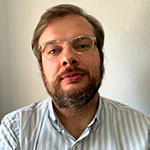 Bernhard Angele
Profesor
Professor
Tiene un máster y un doctorado en psicología experimental de la Universidad de California San Diego. Después de obtener su doctorado, trabajó en la Universidad de Bournemouth, Reino Unido, durante 10 años.
Sus intereses de investigación se centran principalmente en los movimientos oculares durante la lectura en adultos hábiles y el procesamiento del lenguaje. En concreto, ha estudiado el papel que juega el preprocesamiento parafoveal en la lectura.
Su docencia se centra en la psicología cognitiva y los métodos cuantitativos de investigación y estadística.
Bernhard Angele
Profesor
Professor
Tiene un máster y un doctorado en psicología experimental de la Universidad de California San Diego. Después de obtener su doctorado, trabajó en la Universidad de Bournemouth, Reino Unido, durante 10 años.
Sus intereses de investigación se centran principalmente en los movimientos oculares durante la lectura en adultos hábiles y el procesamiento del lenguaje. En concreto, ha estudiado el papel que juega el preprocesamiento parafoveal en la lectura.
Su docencia se centra en la psicología cognitiva y los métodos cuantitativos de investigación y estadística.
 Manuel Blázquez Merino
Profesor
Professor
Doctor Ingeniero en Tecnologías Industriales (2022) por la Escuela Técnica Superior de Ingenieros Industriales de la UNED. Ingeniero Industrial por la Universidad Nacional de Educación a Distancia –UNED–en el área de Electrónica y Automática e Ingeniero Técnico Industrial por ICAI –Universidad Pontificia de Comillas. Premiado con el galardón al mejor proyecto fin de carrera 2009 por la Sociedad de Educación de IEEE (Institute of Electric and Electronic Engineering) y por el Ministerio de Innovación por el trabajo “Creación semiautomática de objetos educativos y metanálisis de Tecnologías Aplicadas a la enseñanza de la electrónica” patrocinado por el Ministerio de Ciencia e Innovación de España. Mención de Excelencia Docente 2015 en la Facultad de Lenguas y Educación de la Universidad Antonio de Nebrija. Profesor de Enseñanza Secundaria desde 1996 en el área de Tecnología en el Instituto Ramiro de Maeztu en Madrid, Manuel ha participado como autor en más de una veintena de libros de textos con editoriales como Anaya, Bruño, Algaida y Santillana.
Manuel Blázquez Merino
Profesor
Professor
Doctor Ingeniero en Tecnologías Industriales (2022) por la Escuela Técnica Superior de Ingenieros Industriales de la UNED. Ingeniero Industrial por la Universidad Nacional de Educación a Distancia –UNED–en el área de Electrónica y Automática e Ingeniero Técnico Industrial por ICAI –Universidad Pontificia de Comillas. Premiado con el galardón al mejor proyecto fin de carrera 2009 por la Sociedad de Educación de IEEE (Institute of Electric and Electronic Engineering) y por el Ministerio de Innovación por el trabajo “Creación semiautomática de objetos educativos y metanálisis de Tecnologías Aplicadas a la enseñanza de la electrónica” patrocinado por el Ministerio de Ciencia e Innovación de España. Mención de Excelencia Docente 2015 en la Facultad de Lenguas y Educación de la Universidad Antonio de Nebrija. Profesor de Enseñanza Secundaria desde 1996 en el área de Tecnología en el Instituto Ramiro de Maeztu en Madrid, Manuel ha participado como autor en más de una veintena de libros de textos con editoriales como Anaya, Bruño, Algaida y Santillana.
 Jon Andoni Duñabeitia Landaburu
Profesor
Professor
Doctor en Psicología por la Universidad de La Laguna, Licenciado en Psicopedagogía por la Universidad de Deusto y Diplomado en Magisterio por la Universidad del País Vasco. Es experto en neurociencia cognitiva del lenguaje. Es Profesor Director e Investigador Principal de la Facultad de Lenguas y Educación de la Universidad Nebrija donde dirige el Grupo de Investigación LAELE, y además es científico asociado al Basque Center on Cognition, Brain and Language (BCBL), donde durante los últimos años ha dirigido el Grupo de Investigación Multilingual Literacy. Tiene amplia experiencia gestionando equipos de trabajo internacionales y proyectos de investigación en entornos interculturales. Su trabajo de investigación se centra en el estudio científico de los aspectos relacionados con la adquisición de lenguas nativas y extranjeras a lo largo del ciclo vital, explorando el papel de la alfabetización multilingüe y el rol de la alternancia de lenguas como medio de instrucción.
Jon Andoni Duñabeitia Landaburu
Profesor
Professor
Doctor en Psicología por la Universidad de La Laguna, Licenciado en Psicopedagogía por la Universidad de Deusto y Diplomado en Magisterio por la Universidad del País Vasco. Es experto en neurociencia cognitiva del lenguaje. Es Profesor Director e Investigador Principal de la Facultad de Lenguas y Educación de la Universidad Nebrija donde dirige el Grupo de Investigación LAELE, y además es científico asociado al Basque Center on Cognition, Brain and Language (BCBL), donde durante los últimos años ha dirigido el Grupo de Investigación Multilingual Literacy. Tiene amplia experiencia gestionando equipos de trabajo internacionales y proyectos de investigación en entornos interculturales. Su trabajo de investigación se centra en el estudio científico de los aspectos relacionados con la adquisición de lenguas nativas y extranjeras a lo largo del ciclo vital, explorando el papel de la alfabetización multilingüe y el rol de la alternancia de lenguas como medio de instrucción.
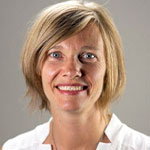 Alice Foucart
Profesora
Professor
She is an expert in Psycholinguistics. Her research focuses on language processing in first and second language and she also investigates how language influences other cognitive aspects such as decision making, emotion processing and social cognition. She conducts her empirical research using behavioural and (electro-)physiological methodologies such as eye-tracking and event-related brain potentials (ERPs).
She obtained a PhD from the University of Edinburgh (UK) and Université de Provence (France) after completing a Master in Sciences of Language (Université de Provence, France, University of York, UK), and a BA in English (University of Lille, France). She worked as post-doctorate fellow in three UK institutions successively (Heriot-Watt University, the University of Edinburgh and the University of Bangor) and then joined the Universitat Pompeu Fabra (Spain) before leading a Marie Sklodowska-Curie project at Ghent University (Belgium). She is now principal investigator of the research group of Applied Linguistics for Foreign Language Teaching (LAELE) in the Faculty of Languages and Education, and of the Centre for Cognitive Science (C3) at Nebrija University.
She teaches (French) Linguistics, Psychology, and Neuroscience at undergraduate and Master levels.
Alice Foucart
Profesora
Professor
She is an expert in Psycholinguistics. Her research focuses on language processing in first and second language and she also investigates how language influences other cognitive aspects such as decision making, emotion processing and social cognition. She conducts her empirical research using behavioural and (electro-)physiological methodologies such as eye-tracking and event-related brain potentials (ERPs).
She obtained a PhD from the University of Edinburgh (UK) and Université de Provence (France) after completing a Master in Sciences of Language (Université de Provence, France, University of York, UK), and a BA in English (University of Lille, France). She worked as post-doctorate fellow in three UK institutions successively (Heriot-Watt University, the University of Edinburgh and the University of Bangor) and then joined the Universitat Pompeu Fabra (Spain) before leading a Marie Sklodowska-Curie project at Ghent University (Belgium). She is now principal investigator of the research group of Applied Linguistics for Foreign Language Teaching (LAELE) in the Faculty of Languages and Education, and of the Centre for Cognitive Science (C3) at Nebrija University.
She teaches (French) Linguistics, Psychology, and Neuroscience at undergraduate and Master levels.
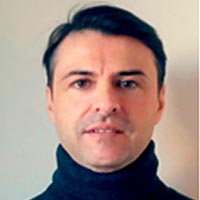 Miguel Gómez Jiménez
Profesor
Professor
Doctor en Lengua española y sus literaturas por la Universidad Complutense y acreditado por la ANECA. En esta misma universidad realizó sus estudios de licenciatura en Filología Hispánica, un Magíster en Traducción de Inglés y un Máster en Estudios literarios europeos; también es licenciado en Filología Inglesa por la Universidad Autónoma de Madrid. Además, es examinador oficial del Instituto Cervantes en los centros de Praga y de Utrecht, en todos los niveles de español. Participa en grupos de investigación de Mitocrítica cultural en relación con la literatura europea y con el impacto de los mitos en las artes contemporáneas. Cuenta con más de diez años de experiencia profesional, imparte clases actualmente en diferentes universidades españolas como profesor de asignaturas de grado y de programas de máster relacionados con la enseñanza en inglés y castellano.
Miguel Gómez Jiménez
Profesor
Professor
Doctor en Lengua española y sus literaturas por la Universidad Complutense y acreditado por la ANECA. En esta misma universidad realizó sus estudios de licenciatura en Filología Hispánica, un Magíster en Traducción de Inglés y un Máster en Estudios literarios europeos; también es licenciado en Filología Inglesa por la Universidad Autónoma de Madrid. Además, es examinador oficial del Instituto Cervantes en los centros de Praga y de Utrecht, en todos los niveles de español. Participa en grupos de investigación de Mitocrítica cultural en relación con la literatura europea y con el impacto de los mitos en las artes contemporáneas. Cuenta con más de diez años de experiencia profesional, imparte clases actualmente en diferentes universidades españolas como profesor de asignaturas de grado y de programas de máster relacionados con la enseñanza en inglés y castellano.
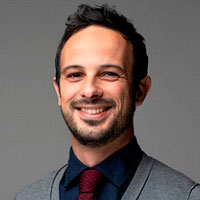 Jorge Gonzalez Alonso
Profesor
Professor
Doctor en Adquisición de Lenguas en Contextos Multilingües por la Universidad del País Vasco (UPV/EHU). Antes de recalar en la Universidad Nebrija, ocupó puestos postdoctorales en universidades de España (País Vasco), Reino Unido (Reading) y Noruega (UiT The Arctic University of Norway). En la actualidad es Subdirector del Centro de Investigación Nebrija en Cognición (CINC), Senior Researcher en el AcqVA Aurora Center (Noruega), e Investigador Principal de tres proyectos financiados por la Comunidad de Madrid, el Research Council of Norway y el Ministerio de Ciencia e Innovación de España, respectivamente. Su investigación se centra en el procesamiento del lenguaje (especialmente léxico y morfosintaxis) por parte de hablantes nativos y no nativos, así como en las bases neuronales de la adquisición de segundas y terceras lenguas, que estudia mediante técnicas como la electroencefalografía (EEG) o el registro de movimientos oculares (eye-tracking).
Jorge Gonzalez Alonso
Profesor
Professor
Doctor en Adquisición de Lenguas en Contextos Multilingües por la Universidad del País Vasco (UPV/EHU). Antes de recalar en la Universidad Nebrija, ocupó puestos postdoctorales en universidades de España (País Vasco), Reino Unido (Reading) y Noruega (UiT The Arctic University of Norway). En la actualidad es Subdirector del Centro de Investigación Nebrija en Cognición (CINC), Senior Researcher en el AcqVA Aurora Center (Noruega), e Investigador Principal de tres proyectos financiados por la Comunidad de Madrid, el Research Council of Norway y el Ministerio de Ciencia e Innovación de España, respectivamente. Su investigación se centra en el procesamiento del lenguaje (especialmente léxico y morfosintaxis) por parte de hablantes nativos y no nativos, así como en las bases neuronales de la adquisición de segundas y terceras lenguas, que estudia mediante técnicas como la electroencefalografía (EEG) o el registro de movimientos oculares (eye-tracking).
 Ángela Hernández Domingo
Profesora
Professor
Licenciada en Bellas Artes (2013) y Máster en Formación de Profesorado de Educación Secundaria Obligatoria, Bachillerato y Formación profesional (especialidad Artes Visuales, 2015) por la Universidad Complutense de Madrid. Actualmente cursa estudios de Doctorado en Bellas Artes en la Universidad Complutense de Madrid y Máster Universitario en Gestión del Patrimonio Cultural y Museología por la Universidad Internacional de Valencia. Investiga sobre la vinculación de la educación artística formal y no formal en la posmodernidad. Tras años de experiencia como Asesora Pedagógica y Project Manager en el Grupo Edelvives, retoma su labor docente en E.S.O y Bachillerato. Imparte docencia en programas bilingües de Educación Secundaria desde 2016/17 y anteriormente ha trabajado en programas de inmersión lingüística durante dos años.
Ángela Hernández Domingo
Profesora
Professor
Licenciada en Bellas Artes (2013) y Máster en Formación de Profesorado de Educación Secundaria Obligatoria, Bachillerato y Formación profesional (especialidad Artes Visuales, 2015) por la Universidad Complutense de Madrid. Actualmente cursa estudios de Doctorado en Bellas Artes en la Universidad Complutense de Madrid y Máster Universitario en Gestión del Patrimonio Cultural y Museología por la Universidad Internacional de Valencia. Investiga sobre la vinculación de la educación artística formal y no formal en la posmodernidad. Tras años de experiencia como Asesora Pedagógica y Project Manager en el Grupo Edelvives, retoma su labor docente en E.S.O y Bachillerato. Imparte docencia en programas bilingües de Educación Secundaria desde 2016/17 y anteriormente ha trabajado en programas de inmersión lingüística durante dos años.
 Ghufran KhirAllah
Profesora
Professor
Dr. Ghufran KhirAllah holds a Ph.D. in Sociolinguistics from the Autónoma University of Madrid. She also has a diploma in Religion and Law in a democratic society: Challenges of Coexistence in a Plural Context from Zaragoza University, Spain. Currently, she is a professor of Sociolinguistics in the official Master class at Nebrija University. Her pedagogical and research approach encompasses cultural diversity, European identity, minority rights in Europe, religious visibility, secularism, feminism, and Muslim womens rights. She has developed a novel research methodology called CCDA (Cognitive Critical Discourse Analysis), which combines Cognitive Linguistics and Critical Discourse Analysis theories to identify the mental frames that control the public debate on cultural diversities. Her expertise includes conceptual metaphors, mental frames, and public discourse on religious minorities. She is the author of "Framing Hijab in the European Mind" book.
Ghufran KhirAllah
Profesora
Professor
Dr. Ghufran KhirAllah holds a Ph.D. in Sociolinguistics from the Autónoma University of Madrid. She also has a diploma in Religion and Law in a democratic society: Challenges of Coexistence in a Plural Context from Zaragoza University, Spain. Currently, she is a professor of Sociolinguistics in the official Master class at Nebrija University. Her pedagogical and research approach encompasses cultural diversity, European identity, minority rights in Europe, religious visibility, secularism, feminism, and Muslim womens rights. She has developed a novel research methodology called CCDA (Cognitive Critical Discourse Analysis), which combines Cognitive Linguistics and Critical Discourse Analysis theories to identify the mental frames that control the public debate on cultural diversities. Her expertise includes conceptual metaphors, mental frames, and public discourse on religious minorities. She is the author of "Framing Hijab in the European Mind" book.
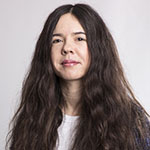 Irini Mavrou
Profesora
Professor
Doctora en Lingüística Aplicada por la Universidad Antonio de Nebrija (Premio Extraordinario de Doctorado), Máster Universitario en el mismo programa y Licenciada en Psicología por la Universidad Aristóteles de Tesalónica (Grecia). Coordinadora del Máster en Lingüística Aplicada de la Universidad Nebrija desde 2016 hasta 2018. Actualmente es profesora de postgrado de la misma universidad y miembro del grupo de investigación LAELE. Ha impartido seminarios de metodología de investigación y estadística y ha participado en los proyectos de investigación IN.MIGRA2-CM [H2015/HUM-3404], EMILIA [FI2017-83166-C2-2-R] Y ERASMUS+ [2016-1-ES01-KA201-025491 (2016-2018)]. Ha supervisado una tesis doctoral y tiene varios en curso, y ha realizado estancias de en las Universidades de Edimburgo (Erasmus+ Staff Mobility) y Birkbeck, University of London (Honorary Research Fellow). Sus publicaciones versan sobre temas relacionados con la memoria operativa, las emociones, la expresión escrita en lengua extranjera, el análisis del discurso y el español como lengua de migración, y se pueden consultar en el siguiente enlace: https://scholar.google.co.uk/citations?user=ugHPB7AAAAAJ&hl=es
Irini Mavrou
Profesora
Professor
Doctora en Lingüística Aplicada por la Universidad Antonio de Nebrija (Premio Extraordinario de Doctorado), Máster Universitario en el mismo programa y Licenciada en Psicología por la Universidad Aristóteles de Tesalónica (Grecia). Coordinadora del Máster en Lingüística Aplicada de la Universidad Nebrija desde 2016 hasta 2018. Actualmente es profesora de postgrado de la misma universidad y miembro del grupo de investigación LAELE. Ha impartido seminarios de metodología de investigación y estadística y ha participado en los proyectos de investigación IN.MIGRA2-CM [H2015/HUM-3404], EMILIA [FI2017-83166-C2-2-R] Y ERASMUS+ [2016-1-ES01-KA201-025491 (2016-2018)]. Ha supervisado una tesis doctoral y tiene varios en curso, y ha realizado estancias de en las Universidades de Edimburgo (Erasmus+ Staff Mobility) y Birkbeck, University of London (Honorary Research Fellow). Sus publicaciones versan sobre temas relacionados con la memoria operativa, las emociones, la expresión escrita en lengua extranjera, el análisis del discurso y el español como lengua de migración, y se pueden consultar en el siguiente enlace: https://scholar.google.co.uk/citations?user=ugHPB7AAAAAJ&hl=es
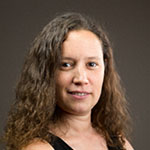 Margarita Planelles Almeida
Profesora
Professor
Doctora en Filosofía por la Universidad de Sevilla. Máster en Lingüística aplicada a la enseñanza del español como lengua extranjera por la Universidad Nebrija. Profesionalmente, ha ejercido la docencia en diferentes centros en España y en el extranjero, y ha colaborado como coach online de segundas lenguas con universidades de California (EEUU). También colabora en la elaboración de materiales didácticos en una editorial especializada en materiales de enseñanza de lenguas extranjeras. Actualmente es profesora en el Departamento de Lenguas Aplicadas y Educación de la Universidad Antonio de Nebrija. Ha realizado estancias de investigación en Alemania, Argentina y Canadá, y sus investigaciones han sido publicadas en revistas científicas y difundidas en congresos y conferencias internacionales. Sus principales líneas de investigación abarcan la psicolingüística, el análisis de errores y la adquisición y enseñanza de la competencia fonético-fonológica. En relación a la asignatura y a las competencias profesionales del área, ha publicado: Planelles Almeida, M. y Doquin de Saint-Preux, A. (2018). Nivel de competencia fonológica y edad de inicio de adquisición de español L2 en inmigrantes francófonos residentes en España. Revista Española de Lingüística Aplicada, 31:2. Planelles Almeida, M., Torrado Solo de Zaldívar, P., Martínez-Delgado Veiga, M., Cruz Moya, O. y Herrero Fernández, C. (2017). ¡Genial!: Curso de español. Madrid: EnClave-ELE. Planelles, M.; Doquin de Saint-Preux, A. (2017) La selección de jueces nativos para la evaluación del acento extranjero en aprendices de español L2. E-AESLA, 3, ISSN: 2444-197X.
Margarita Planelles Almeida
Profesora
Professor
Doctora en Filosofía por la Universidad de Sevilla. Máster en Lingüística aplicada a la enseñanza del español como lengua extranjera por la Universidad Nebrija. Profesionalmente, ha ejercido la docencia en diferentes centros en España y en el extranjero, y ha colaborado como coach online de segundas lenguas con universidades de California (EEUU). También colabora en la elaboración de materiales didácticos en una editorial especializada en materiales de enseñanza de lenguas extranjeras. Actualmente es profesora en el Departamento de Lenguas Aplicadas y Educación de la Universidad Antonio de Nebrija. Ha realizado estancias de investigación en Alemania, Argentina y Canadá, y sus investigaciones han sido publicadas en revistas científicas y difundidas en congresos y conferencias internacionales. Sus principales líneas de investigación abarcan la psicolingüística, el análisis de errores y la adquisición y enseñanza de la competencia fonético-fonológica. En relación a la asignatura y a las competencias profesionales del área, ha publicado: Planelles Almeida, M. y Doquin de Saint-Preux, A. (2018). Nivel de competencia fonológica y edad de inicio de adquisición de español L2 en inmigrantes francófonos residentes en España. Revista Española de Lingüística Aplicada, 31:2. Planelles Almeida, M., Torrado Solo de Zaldívar, P., Martínez-Delgado Veiga, M., Cruz Moya, O. y Herrero Fernández, C. (2017). ¡Genial!: Curso de español. Madrid: EnClave-ELE. Planelles, M.; Doquin de Saint-Preux, A. (2017) La selección de jueces nativos para la evaluación del acento extranjero en aprendices de español L2. E-AESLA, 3, ISSN: 2444-197X.
 María Teresa Rossignoli Palomeque
Profesora
Professor
Doctora Cum Laude en Psicología por la UCM (2020), Máster en Neuropsicología Infantil (2010-2012 UCM) y Ldo. Psicopedagogía (2010, UCM). Actualmente, dirige el máster de Cognición y Emoción en Contextos Educativos en la Universidad de Nebrija. Además, pertenece a los grupos de investigación CINC (Centro de investigación Nebrija en Cognición) y CEDI (Cognición, Educación y Diferencias Individuales) de la misma Universidad. Imparto docencia en el máster que dirijo, así como en los grados de Infantil y Primaria. Además, participa como docente en otros programas de máster universitario como el MU en Enseñanza Bilingüe o el MU en ELE de la Universidad Antonio de Nebrija Posee experiencia anterior como personal docente-investigador en el Centro Universitario Cardenal Cisneros (programa bilingüe), profesora asociada en la Universidad Autónoma de Madrid, y docente en Master de Neuropsicología en la Universidad Operta de Catalunya entre otros. A su vez, cuenta con amplia experiencia en intervención neuropsicológica y coordinación del departamento de Neuropsicología Infantil en el Centro Comunica. Durante más de 8 años, trabajé con niños y adolescentes con dificultades de aprendizaje como dislexia, Trastorno por Déficit de Atención e Hiperactividad (TDAH), dificultades en habilidades sociales etc. y su relación con diferentes procesos de enseñanza-aprendizaje.
María Teresa Rossignoli Palomeque
Profesora
Professor
Doctora Cum Laude en Psicología por la UCM (2020), Máster en Neuropsicología Infantil (2010-2012 UCM) y Ldo. Psicopedagogía (2010, UCM). Actualmente, dirige el máster de Cognición y Emoción en Contextos Educativos en la Universidad de Nebrija. Además, pertenece a los grupos de investigación CINC (Centro de investigación Nebrija en Cognición) y CEDI (Cognición, Educación y Diferencias Individuales) de la misma Universidad. Imparto docencia en el máster que dirijo, así como en los grados de Infantil y Primaria. Además, participa como docente en otros programas de máster universitario como el MU en Enseñanza Bilingüe o el MU en ELE de la Universidad Antonio de Nebrija Posee experiencia anterior como personal docente-investigador en el Centro Universitario Cardenal Cisneros (programa bilingüe), profesora asociada en la Universidad Autónoma de Madrid, y docente en Master de Neuropsicología en la Universidad Operta de Catalunya entre otros. A su vez, cuenta con amplia experiencia en intervención neuropsicológica y coordinación del departamento de Neuropsicología Infantil en el Centro Comunica. Durante más de 8 años, trabajé con niños y adolescentes con dificultades de aprendizaje como dislexia, Trastorno por Déficit de Atención e Hiperactividad (TDAH), dificultades en habilidades sociales etc. y su relación con diferentes procesos de enseñanza-aprendizaje.
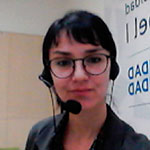 Alicia Sola Prado
Profesora
Professor
Doctora en Didáctica de la Lengua y la Literatura por la Universidad de Barcelona, con amplia experiencia docente en educación secundaria y en formación superior universitaria internacional en los ámbitos de didáctica de la lengua y la literatura, español e inglés como lengua extranjera y didáctica general e investigación educativa. Miembro desde 2011 del grupo de investigación consolidado por la AGAUR ‘GREP’ (Grup de Recerca en Entonació i Parla). Ha participado en proyectos de investigación I+D, como el de Análisis del Habla y Modelos Didácticos, ha dirigido un Proyecto de innovación sobre didáctica de la interacción oral de los idiomas nacionales y extranjeros del sistema educativo del Ecuador, coordinado la línea de investigación sobre Didáctica de la Lengua y la Literatura de la Universidad Isabel I, y dirigido un proyecto de investigación en esta misma línea. Sus aportaciones técnico científicas se insertan en las líneas de la didáctica de segundas lenguas y la fonética acústica o análisis prosódico del habla.
Alicia Sola Prado
Profesora
Professor
Doctora en Didáctica de la Lengua y la Literatura por la Universidad de Barcelona, con amplia experiencia docente en educación secundaria y en formación superior universitaria internacional en los ámbitos de didáctica de la lengua y la literatura, español e inglés como lengua extranjera y didáctica general e investigación educativa. Miembro desde 2011 del grupo de investigación consolidado por la AGAUR ‘GREP’ (Grup de Recerca en Entonació i Parla). Ha participado en proyectos de investigación I+D, como el de Análisis del Habla y Modelos Didácticos, ha dirigido un Proyecto de innovación sobre didáctica de la interacción oral de los idiomas nacionales y extranjeros del sistema educativo del Ecuador, coordinado la línea de investigación sobre Didáctica de la Lengua y la Literatura de la Universidad Isabel I, y dirigido un proyecto de investigación en esta misma línea. Sus aportaciones técnico científicas se insertan en las líneas de la didáctica de segundas lenguas y la fonética acústica o análisis prosódico del habla.
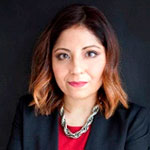 Melisa Teves Romero
Profesora
Professor
Graduada en Filología Inglesa y licenciada en Traducción e Interpretación por la Universidad Ricardo Palma. Máster en Estudios Literarios y Culturales Británicos por la UAM, donde se encuentra realizando el doctorado en Estudios Artísticos, Literarios y de la Cultura.
Cuenta con una amplia experiencia docente. En el ámbito de la enseñanza de idiomas, ha trabajado como profesora de inglés y español como lengua extranjera en diversas instituciones públicas y privadas en Perú, España y Bélgica. Asimismo, ha impartido clases de estudios de género y literatura tanto en inglés como en español. Cuenta con numerosas comunicaciones en congresos nacionales e internacionales. Sus campos de investigación incluyen teoría postcolonial, estudios de género y literatura inglesa del siglo XVIII. También le interesan las nuevas tecnologías aplicadas a la enseñanza de lenguas modernas, la comunicación intercultural y el aprendizaje basado en proyectos.
Melisa Teves Romero
Profesora
Professor
Graduada en Filología Inglesa y licenciada en Traducción e Interpretación por la Universidad Ricardo Palma. Máster en Estudios Literarios y Culturales Británicos por la UAM, donde se encuentra realizando el doctorado en Estudios Artísticos, Literarios y de la Cultura.
Cuenta con una amplia experiencia docente. En el ámbito de la enseñanza de idiomas, ha trabajado como profesora de inglés y español como lengua extranjera en diversas instituciones públicas y privadas en Perú, España y Bélgica. Asimismo, ha impartido clases de estudios de género y literatura tanto en inglés como en español. Cuenta con numerosas comunicaciones en congresos nacionales e internacionales. Sus campos de investigación incluyen teoría postcolonial, estudios de género y literatura inglesa del siglo XVIII. También le interesan las nuevas tecnologías aplicadas a la enseñanza de lenguas modernas, la comunicación intercultural y el aprendizaje basado en proyectos.
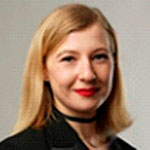 Elena Víktorovna Navrotskaya
Profesora
Professor
Licenciada en Periodismo por la Universidad Estatal de Moscú. Es máster en Publicidad y Empresa por la UBA, máster en Pensamiento Español e Iberoamericano por la UAM, máster en Formación del Profesorado por la Universidad Nebrija. Doctora en Estudios Hispánicos por la UAM (Mención Cum Laude). Cuenta con una amplia experiencia en el ámbito docente. Ha sido profesora de inglés y asignaturas relacionadas con historia y cultura durante muchos años, enseñando en centros de formación, academias y colegios. Cuenta con certificados oficiales que acreditan su maestría en dominio de inglés (CPE) y español (DELE C2) y sus habilidades profesionales (CELTA). Actualmente imparte asignaturas de grado y máster (Curricular Development in English, English Didactics, Organization of Bilingual Centres in Spain) en dos universidades. Está interesada en metodologías de enseñanza, literatura (está cursando el grado de Estudios Ingleses en la UNED) y música. Habla inglés, español, ruso y francés.
Elena Víktorovna Navrotskaya
Profesora
Professor
Licenciada en Periodismo por la Universidad Estatal de Moscú. Es máster en Publicidad y Empresa por la UBA, máster en Pensamiento Español e Iberoamericano por la UAM, máster en Formación del Profesorado por la Universidad Nebrija. Doctora en Estudios Hispánicos por la UAM (Mención Cum Laude). Cuenta con una amplia experiencia en el ámbito docente. Ha sido profesora de inglés y asignaturas relacionadas con historia y cultura durante muchos años, enseñando en centros de formación, academias y colegios. Cuenta con certificados oficiales que acreditan su maestría en dominio de inglés (CPE) y español (DELE C2) y sus habilidades profesionales (CELTA). Actualmente imparte asignaturas de grado y máster (Curricular Development in English, English Didactics, Organization of Bilingual Centres in Spain) en dos universidades. Está interesada en metodologías de enseñanza, literatura (está cursando el grado de Estudios Ingleses en la UNED) y música. Habla inglés, español, ruso y francés.
More Academic Information
Skills
Basic Skills- Possess and understand knowledge that provides the foundation or opportunity to be original in the development and/or application of ideas, often in a research context.
- That students know how to apply the knowledge acquired and their ability to solve problems in new or little-known environments within broader (or multidisciplinary) contexts related to their area of study.
- That students are able to integrate knowledge and face the complexity of formulating judgments based on information that, being incomplete or limited, includes reflections on the social and ethical responsibilities linked to the application of their knowledge and judgments.
- That students know how to communicate their conclusions, as well as the knowledge and ultimate reasons that support them, to specialized and non-specialized audiences in a clear and unambiguous way.
- That students possess the learning skills that allow them to continue studying in a way that will be largely self-directed or autonomous.
- GC1 Know, and know how to apply, the theories, linguistic models and methodologies of FL teaching in a class.
- GC2 Know the specific problems of FL teaching, both linguistic and cultural in a bilingual teaching environment.
- GC3 Apply the knowledge acquired in terms of making appropriate decisions in relation to the different factors involved in the processes of learning and teaching FL.
- GC4 Be able to carry out a critical analysis, evaluation and summary of new and complex ideas that allow autonomy in education and continuous updating of knowledge in the field of FL teaching.
- GC5 Be able to transmit social and cultural values in accordance with multilingual and multicultural current affairs.
- GC6 Know how to communicate with colleagues from the academic community and with society in general about their areas of knowledge in the field of bilingual education.
- GC7 Acquire basic theoretical knowledge aimed at establishing an informed teaching practice in the field of bilingual education.
- GC8 Know the legislation and regulations regarding the management and organization of bilingual centers.
- GC9 Analyze the psychological processes and the factors that intervene in the learning of a FL.
- GC10 Know and apply basic methodologies and techniques of educational research in the field of bilingual education.
- SC1 Design integrated curricula within their area of knowledge along with linguistic content to develop English/Spanish bilingual teaching programs.
- SC2 Create and adapt didactic materials for bilingual English/Spanish teaching, graduating the linguistic level and with sensitivity to the different learning rhythms, adapting the authentic material and turning it into didactic material.
- SC3 Know the necessary planning and evaluation instruments in the teaching/learning of English/Spanish.
- SC4 Develop and apply teaching methodologies adapted to the diversity of students in a bilingual English/Spanish environment.
- SC5 Assess both linguistic and sociocultural content in bilingual English/Spanish teaching.
- SC6 Incorporate new strategies, teaching materials and information technologies to the activities in the English/Spanish bilingual classroom.
- SC7 Incorporate the knowledge acquired in the master's degree in the development of planning, defense and implementation work in the field of Bilingual Education.
- SC8 Be able to use specialized terminology in English and Spanish in the field of second language acquisition.
- SC9 Be able to assess, select and use literary texts suitable for the development of linguistic competence and the approximation to the socio-cultural context of FL (Spanish/English).
- SC10 Be able to communicate fluently at C1 level of the CEFR.
- SC11 Be able to apply different strategies for teaching communication skills (interaction and oral and written production and reception) according to the characteristics of FL learners.
- SC12 Know the different variables of the FL teaching/learning process from the perspective of the student and their communicative needs; of the process itself; of its continuous and certifying evaluation.
- SC13 Know, and know how to apply, the advantages of the communicative approach and task-based learning for linguistic interaction in English and Spanish.
- SC14 Know the teaching/learning methodology based on Content and Language Integrated Learning (CLIL) and design and develop didactic activities based on said methodology.
- SC15 Know the curricular elements, the methodology and the objectives of the area of Social Sciences.
- SC16 Be able to adapt the contents to the diversity of the students for the area of Social Sciences, Geography and History.
- SC17 Be able to use the most appropriate teaching techniques for the area of Social Sciences, Geography and History.
- SC18 Know the curricular elements, the methodology and the objectives of the area of Natural and Social Sciences in a bilingual environment.
- SC19 Be able to adapt the contents to the diversity of the students for the area of Natural and Social Sciences.
- SC20 Be able to use the most appropriate teaching techniques for the area of Natural and Social Sciences.
- SC21 Know the curricular elements, the methodology and the objectives of the area of Artistic Education in a bilingual environment.
- SC22 Be able to adapt the contents to the diversity of the students for the area of Artistic Education.
- SC23 Be able to use the most appropriate teaching techniques for the area of Artistic Education.
- SC24 Know the curricular elements, the methodology and the objectives of the Technology area in a bilingual environment.
- SC25 Be able to adapt the contents to the diversity of the students for the Technology area.
- SC26 Be able to use the most appropriate teaching techniques for the Technology area.
- SC27 Know the curricular elements, the methodology and the objectives of the area of Natural Sciences (Biology, Geology, Physics and Chemistry) in a bilingual environment.
- SC28 Be able to adapt the contents to the diversity of Natural Sciences students (Biology, Geology, Physics and Chemistry).
- SC29 Be able to use the most appropriate teaching techniques for the area of Natural Sciences (Biology, Geology, Physics and Chemistry).
- SC30 Know the curricular elements, the methodology and the objectives of the area of Literature and culture in the English language in a bilingual environment.
- SC31 Be able to adapt the contents to the diversity of students in the area of Literature and culture in the English language.
- SC32 Be able to use the most appropriate didactic techniques for the area of Literature and culture in the English language.
- SC33 Know and analyze the organization of Bilingual Education centers and the diversity of actions that comprise their operation.
- SC34 Know quality educational management models and their application in schools.
- SC35 Know and analyze the current educational legislation regarding bilingual and multilingual education.
- SC36 Show abilities to investigate different aspects of teaching in bilingual environments.
- SC37 Prepare, use and interpret the basic and most used educational indicators to describe the situation of educational institutions.
- SC38 Become familiar with the design, development and evaluation of educational research on the teaching and learning of foreign languages/second languages.
Online Studies
MethodologyCompatibility with professional and personal life
The methodology of the Master's Degree in Bilingual Education allows students to receive online teaching late in the afternoon, where and how they want, with the only requirement of Internet access and availability of audio equipment (headphones and microphone) and of video (webcam).
AF 1. Teaching sessions
AF1.1 Online teaching sessions, via Internet, through the Nebrija Virtual Campus:
The subjects in which studying in the Virtual Campus has more importance have a prepared EDUCATIONAL ITINERARY, in which the units of the curriculum are described. The structure of the Itinerary is hypertextual, since it has content Blocks, divided into Units. In each of these units, a complete lesson is provided; other related topics are referenced, hyperlinks are used to explain or present; complementary information on concepts, definitions, bibliography is added through sales and connections with the documentation center of the subject. The professor can also teach a lecture using the VIDEOCONFERENCE system.
AF2. Individual and group learning activities outside of the classroom
The type of activities that the Master's degree students carry out outside the teaching sessions are varied, complementary and related to each other, and connected to the partial and gradual obtaining of competences. As an example, we point out some educational activities that will be carried out in all the subjects of the Master's degree:
- Search, selection, organization and ranking of information in different sources.
- Analysis of qualitative and quantitative data from different backgrounds (grammatical, sociolinguistic, errors, etc.) of design proposals, exercises, teaching activities, short and specific research projects.
- Design of proposals, exercises, teaching activities, short and specific research projects.
- Resolution of practical cases regarding different aspects of the teaching process for L2.
- Development of outlines, concept maps, glossaries, didactic sequences, evaluation instruments.
- Preparation of Reports at the end of the work carried out, of reviews, of conceptual and practical questionnaires on subjects studied, that are useful for the preparation of exams.
AF3. Tutoring sessions
The tutoring sessions are the responsibility of the professors of the subjects, the coordinator and the director of the Master's Degree in Bilingual Education. Group and personal tutoring sessions are carried out in order to achieve a general climate of cooperation and mutual respect among the students of the group; to promote cooperation between professors of the Master's degree in a vertical and horizontal coordination; to guide students, personally and professionally, making them aware of their vocational possibilities to achieve the proposed goals.
AF4. Complementary educational actions
Seminars, specialized congresses and conferences on topics related to the subjects of the area of knowledge.
AF5. Professional internship activities
The students carry out professional internships of a duration equivalent to 6 ECTS credits during the academic year of the Program, in primary and secondary bilingual schools with which the university has agreements. Students carry out the tasks that are assigned by the tutor responsible for their follow-up in the institution where the internships are carried out. These educational activities are supervised by the coordinator of the Master's degree, who is responsible for verifying that the student completes his Internship Report and submits the corresponding certificate from the external tutor, with a detailed report of the competences that were exercised and achieved.
Practical activities are always done in person, in the institution in which they are carried out. There is only one exception in the case of practical activities in ICT environments. Some students of the Master's degree can carry out their internship in specialized portals, as well as in digital platforms of publishers that support the pedagogical counseling of the publishing house. In that case, all the practical activities are carried out online and the periodic tutoring sessions, with the person in charge of monitoring this matter, can be face-to-face in the university, or virtually through email communication, videoconferencing or Skype, when the portal's headquarters are in another country.
AF6. Preparation, presentation and defense of the Master's Degree Final Research Project
Preparation of an academic paper, of applied research, which can be framed in any of the topics pertaining to the Master's degree subjects.
AF7. Evaluation Activities
As it is characteristic of an active, constructive and cooperative learning and teaching methodology, the evaluation activities are varied. The Master's degree students can be evaluated for various tasks, among which we can highlight the following:
- Participation in lectures, based on previous reading of the bibliography and discussion topics.
- Participation in individual and group tutorials.
- Participation in the Virtual Campus Forums on the proposed topics.
- Performing work in groups.
- Carrying out a conceptual exam to verify the assimilation of the new concepts contributed by the units of the subject.
- Review of scientific journals specializing in applied linguistics and foreign language acquisition theories.
- Completion of applied assignments that are related to the contents of the subject
- Design of programs taking into account the analysis of needs according to student characteristics, expectations and learning contexts.
- Design of teaching materials in conventional media and ICTs
- Preparation of Reports, with all academic requirements, following the guidelines provided.
- Preparation and presentation of expository, oral and written academic papers, following the guidelines of the macrostructure, style, Harvard citation standards and all the requirements of the channel and support used.
- Portfolio or professional folder with record of critical reflections, assignments, didactic designs and self-assessment.
The teaching of the subjects and the distribution of the student's work time (virtual, in-person and online) will be distributed as follows throughout the academic year.
1st SEMESTER: FROM OCTOBER TO FEBRUARY
- October: start of the course.
Orientation Session and Presentation of the Master’s Degree. - From October to February.
- Subjects covered:
- Module I: Fundamentals of bilingual education (12 ECTS credits).
- Module II: Instrumental Language. Communication Competences I and II (8 ECTS credits of 12).
- Module III: CLIL/AICLE. Design and programming of CLIL courses (4 ECTS credits of 8).
- Virtual and online work per week:
- Monday: sending of teaching material.
- Tuesday, Wednesday and Thursday: 2-hour virtual session.
- Wednesday, Thursday and Friday: sending of exercises done by the student.
- Subjects covered:
- February:
- Subjects covered:
- Ordinary exam period.
- Language immersion period in Nebrija:
From Wednesday to Saturday: language workshops and immersion.
- Subjects covered:
2nd SEMESTER: FROM MARCH TO JULY
- From February to June::
- Subjects covered:
- Module II: Instrumental Language Communication Competences III (4 ECTS credits of 12).
- Module III: CLIL/AICLE Development of CLIL materials (4 ECTS credits of 8).
- Module V: Elective subjects (12 ECTS credits).
- Ordinary exam period.
- Class attendance period.
- Virtual and online work per week:
- Monday: sending of teaching material.
- Tuesday, Wednesday and Thursday: 2-hour virtual session.
- Wednesday, Thursday and Friday: sending of exercises done by the student.
- Subjects covered:
- June::
- Subjects covered:
- Ordinary exam period.
- Language immersion period in Nebrija:
- From Wednesday to Saturday: language workshops and immersion.
- Subjects covered:
EXTRAORDINARY EXAM SESSION
- 1st and 2nd semester: last week of June - first week of July.
STAY ABROAD PERIOD
- Subjects covered: Module IV: Stay abroad (6 ECTS credits).
- Two-week course to be taken in July or August.
PRACTICUM PERIOD AND FINAL RESEARCH PROJECT
- Subjects covered: Module VI: Practicum and final research project (12 ECTS credits).
- 150 hours of internships in bilingual centers during the academic year or throughout the following year
- Final research project for the master's degree with several calls for presentation throughout the following academic year.
Although the evaluation system may vary depending on the particular characteristics of each subject, in general, the evaluation system is structured around the following elements:
- Participation in online sessions.
- Participation in forums and other activities programmed through the virtual campus.
- Participation in individual and group tutoring sessions.
- Follow-up tests by teaching unit.
- Practical tests or evaluation work by module.
- Final in-person test or project (not in-person).
- Carrying out work in groups.
- Taking a conceptual exam to verify the assimilation of the new concepts contributed by the subjects.
- Review of scientific journals specialized in applied linguistics and theories of foreign language acquisition.
- Completion of applied assignments that are related to the contents of the subject
- Design of programs taking into account the analysis of needs according to student characteristics, expectations and learning contexts.
- Design of teaching materials in conventional media and ICTs
- Preparation of Reports, with all academic requirements, following the guidelines provided.
- Preparation and presentation of expository, oral and written academic papers, following the guidelines of the macrostructure, style, Harvard citation standards and all the requirements of the channel and support used.
- Portfolio or professional folder with record of critical reflections, assignments, didactic designs and self-assessment.
- Taking a conceptual exam to verify the assimilation of the new concepts contributed by the subjects.
The final exams of each subject can consist of an in-person exam, as well as the presentation of a project or a didactic unit.
In the final grade of the subject, the grade of said final exam is weighted with the rest of the evaluation elements, with varying weighting percentages for the different concepts, depending on the specific contents of the topic and subject. The specific weighting percentages in each subject appear in the documentation given to the student at the beginning of the course.
All grades will be accessible via the Internet, in the student's private area.
Evaluation Examples:
Subject: Didactics of Natural Sciences (Biology and Geology and Physics and Chemistry).
Evaluation system: Participation in work groups and discussions 15%. Directed activities (critical reading of texts, evaluation of materials and teaching resources) 25%. Design of Didactic Unit 60%.
Subject: English Literature and Culture.
Evaluation system: Participation in work groups and discussions 15%. Directed activities (critical reading of texts, reviews) 15%. Conceptual exam 70%.
Evaluation system for the Final Research Project
The reading and defense of the Master's degree Final Research Project can only be done once the rest of the subjects of the Curriculum are passed.
The final grade of the project will be established by weighing the grade given by the Tribunal (50%) and the grade of the Project Tutor (50%).
Admissions
Admission requirements
As established in article 16 of RD 1393/2007, modified by RD 861/2010, students who meet any of the following conditions may access these studies:
- Have an official Spanish university degree, or another degree issued by an institution of higher education of the European Higher Education Area that grants access to Master's studies in the country issuing that degree.
- Graduates of educational systems outside the European Higher Education Area may access without the need for the homologation of their degrees, after verification by the University that they accredit a level of training equivalent to the corresponding official Spanish university degrees, and that they grants access, in the country issuing their degree, to postgraduate education.
- The access by this means will not imply, in any case, the homologation of interested party's previous degree, nor its recognition for other purposes than that of taking the Master's studies. In cases where the homologation of any degree, diploma or study obtained abroad for access to the University is required, Antonio de Nebrija University may conditionally admit students who accredit having submitted the corresponding application for its homologation while the procedure is resolved.
- In the case of students with special educational needs derived from disability, the need for possible curricular adaptations, itineraries or alternative studies will be assessed.
Form of submission of the necessary documentation for admission.
In general, the admission documentation will be submitted to the Admissions Department.
The student must provide the originals or certified copies of the documentation submitted within a period established by the University in order to formalize their enrollment. Any inaccuracy, falseness or omission of the data, statement or document provided by the student in the admission period will imply the impossibility of him/her continuing to exercise the right from the moment the University has proof of these facts, proceeding to the cancellation of the application for admission and the place that was awarded, without prejudice to any criminal, civil or administrative responsibilities that may arise.
In order to access the official university master's degrees, it is necessary to submit the following documentation:
- Completed Admission Application.
- ID document (D.N.I.) or valid passport.
- 1 passport-size photograph.
- Academic Record with the grades of the studies that grant access to the Master's degree.
- Certified photocopy of the degree of the official Spanish university or receipt thereof.
Foreign students:
- Certified photocopy of the official degree issued by a foreign higher education institution belonging to the European Higher Education Area (EHEA) that grants access to official master's education in the issuing country.
- Certified photocopy of the official degree issued in a foreign education system not belonging to the EHEA. In this case, access will be conditioned to the verification that the studies completed correspond to a level of training equivalent to that of the official Spanish university degrees, and that they qualify to access official master's degrees in the issuing country. This procedure does not imply, in any case, the homologation of the previous degree, nor its recognition for any purpose other than to access the master's degree studies.
- Only in the case that it is necessary, the foreign student will be asked for a letter issued by the University in which he/she has completed the level that grants access to the Master's studies in the country issuing the degree.
In the event that the studies used to access the pre-registration of the Master's Degree are taken in an institution of Foreign Higher Education, both the degree and the academic record (grades) must be official and issued by the competent authorities, in agreement with the legal system of the country of origin.
If the number of applicants exceeds the number of places offered, the student's academic record (average grade) will be taken as admission criteria.
Therefore, all those interested in accessing the studies of the Master's Degree in Bilingual Education must submit, without exception, their academic record, as it will be the average grade that decides their admission to the Master's degree, in the event that the number of applications exceed the number of places offered.
Once the places are full, in the case of having more people interested in accessing the degree, they will remain on the waiting list in the event of possible open spots that may arise before the beginning of the course, applying the admission and selection criteria detailed in point 4 for the rest of applicants.
In addition to the evaluation of the academic merits provided by the candidate (40%), students must take the following tests that are part of the admission process.
- Foreign language level test (40%)
In order to know the students' real level of knowledge of the foreign language, the Institute of Modern Languages performs a language positioning test. The level tests consist of a written exam with multiple-choice questions, oral and written comprehension, and use of the language. They are taken both in-person and online (20%).
It will not be necessary for the candidate to take the language positioning test if he/she submits certification that proves knowledge of a foreign language (English) with B2 level of the CEFR. The accreditation of the level will be validated through the official diplomas admitted in the certificates table of ACLES.
All candidates will also conduct an interview in English with the program director/coordinator (20%). - Personal interview (20%)
Conducted by the person in charge of the Academic Program or by advisors of the University, this interview is oriented to verify the suitability and profile of the candidate in accordance with the degree. This means determining if the candidate has sufficient motivation, training and knowledge, Competences, aptitudes, communication Competences, extracurricular activities and future interests necessary to be admitted as a student in the postgraduate courses of Nebrija University.
A Preparation Course will be offered on the essential basic concepts and Competences (indicated below), to guarantee the success of those admitted in the different subjects of the Educational Period, which correspond to the 60 ECTS credits of the Master's Degree in Bilingual Education. The preparation course consists of two parts:
- Linguistics applied to language teaching: Basic contents of Psycholinguistics, Sociolinguistics and Pragmatics.
- Teaching English as a foreign language:
- Didactic reflection on vocabulary and grammar
- Initiation to the CLIL methodology
Employability
Career Opportunities
The Master's Degree in Bilingual Education is a response to the growing demand for competent bilingual teachers in the context of ongoing globalisation and the needs of education to reflect the challenges of communication that the twentieth first century presents.
It is essential to strengthen the students' communicative competence in English to nurture their academic, cultural and economic dynamics, and to enhance their opportunities for employment, mobility and personal growth. Likewise, the implementation of bilingual programs throughout Spain and increasingly across the globe, in which second languages become the vehicle for instruction and communication, has made it essential to have teachers who have developed the appropriate linguistic and methodological preparation.
There are numerous centers interested in hiring staff with the necessary Competences for primary and secondary education, and with the communication and teaching Competences necessary to teach in the bilingual modality.
Internships
Collaborating institutions Procedure for carrying out external internships Management process for external internships and professional guidanceTestimonials
Activities in Bilingual Education
Visit all the Activities of the School of Language and Education
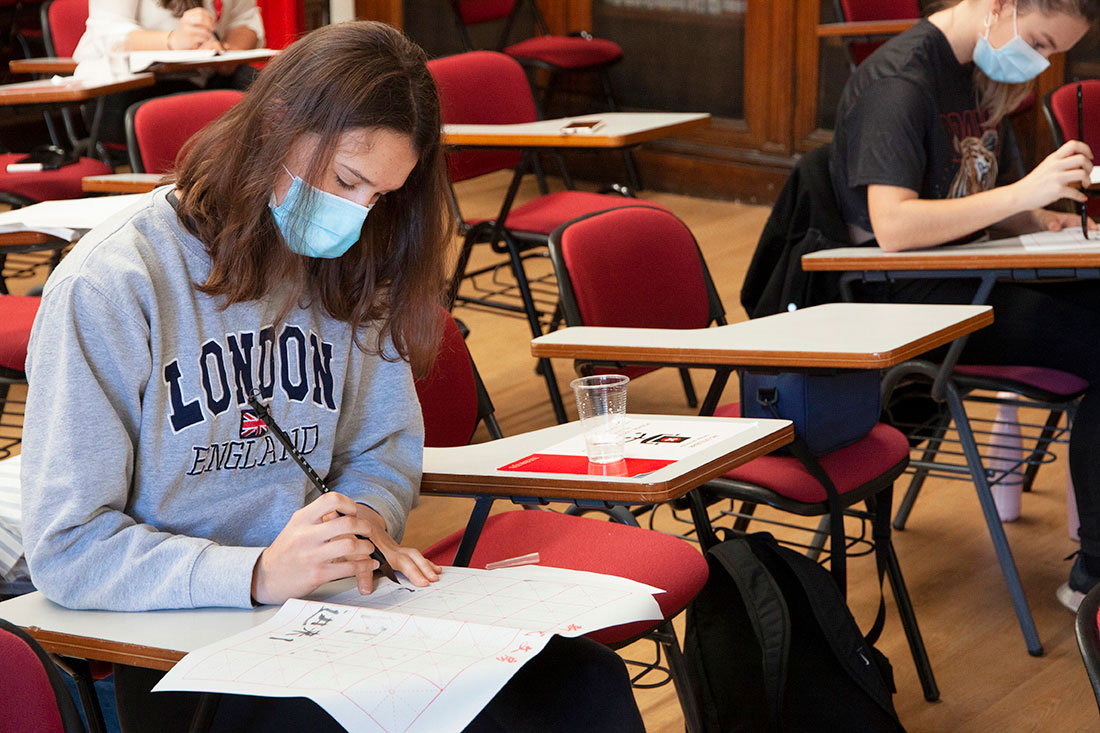
Click on the image to see more
Chinese culture and Nebrija's teaching cross paths
On May 10, the Nebrija Institute of Modern Languages (ILM) hosted a workshop organized and directed by the department's Chinese language teachers, Yanyan Xi (Camila) and Yuanyuan Shen (Jonah). One of the best ways to get closer to a culture is by learning its language, but this time the teachers wanted to get closer to this ancestral culture in a more plastic and playful way.
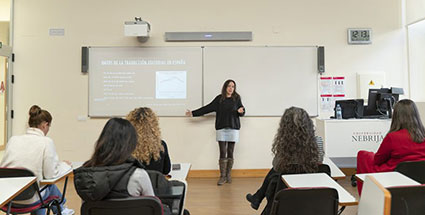
Differences between language and tongue
Lecture by linguist Itziar Laka at Nebrija University on the articulation of language, the differences with tongues and their processing by the users.
Based on the fact that language has a predetermined biological component with its own patterns of development and maturation, and without it being clear that syntax is represented and computed in the same circuits, Laka wonders how bilingual and multilingual speakers process human language. Together with her team, she has spent years researching how languages with very different grammars are processed, and what strategies bilingual speakers use when using them.
See articleLet’s Talk About Education
First chapter of the video podcast specialized in Education where research processes and their application in neuroscience and the educational sector are analyzed.
4th Nebrija International Congress on Linguistics Applied to Teaching Languages
The School of Languages and Education organizes this congress that serves as a meeting point for researchers and professors, both expert and new, to have the opportunity to share the results of their studies and didactic experiences.




